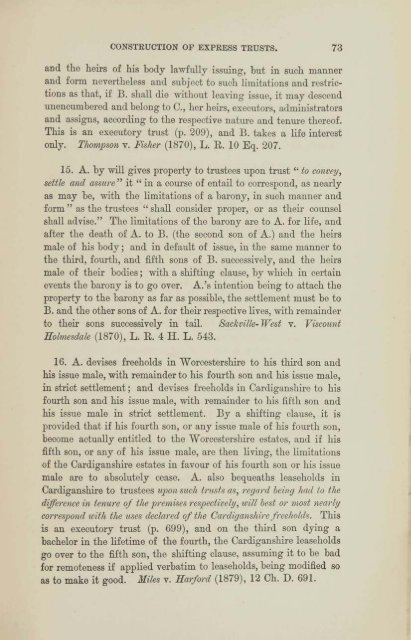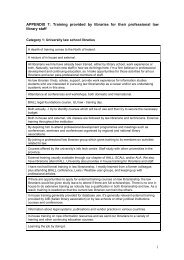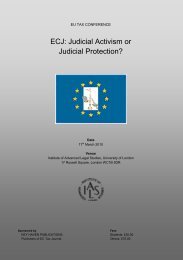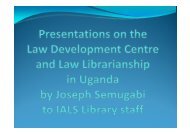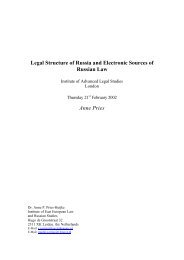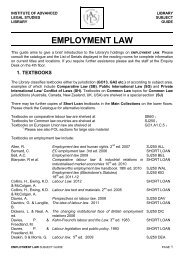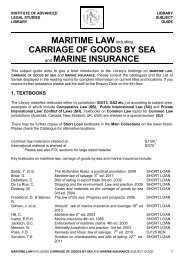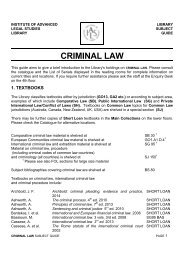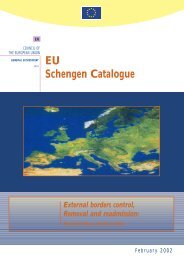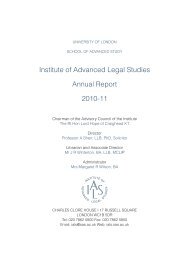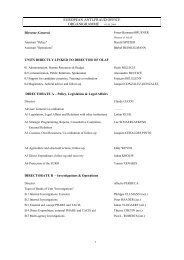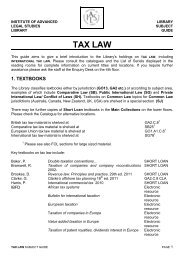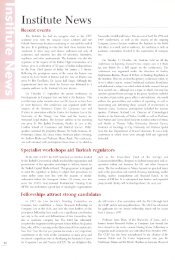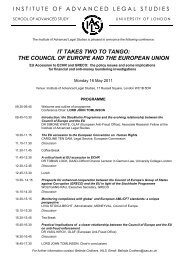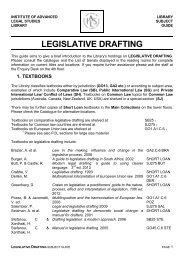a thesis - Institute of Advanced Legal Studies
a thesis - Institute of Advanced Legal Studies
a thesis - Institute of Advanced Legal Studies
You also want an ePaper? Increase the reach of your titles
YUMPU automatically turns print PDFs into web optimized ePapers that Google loves.
CONSTRUCTION OF EXPRESS TRUSTS. 73<br />
and the heirs <strong>of</strong> his body lawfully issuing, but in such manner<br />
and form nevertheless and subject to such limitations and restrictions<br />
as that, if B. shall die without leaving issue, it may descend<br />
unencumbered and belong to 0., her heirs, executors, administrators<br />
and assigns, according to the respective nature and tenure there<strong>of</strong>.<br />
This is an executory trust (p. 209), and B. takes a life interest<br />
only. Thompson v. Fisher (1870), L. E. 10 Eq. 207.<br />
15. A. by will gives property to trustees upon trust " to convey,<br />
settle and assure " it " in a course <strong>of</strong> entail to correspond, as nearly<br />
as may be, with the limitations <strong>of</strong> a barony, in such manner and<br />
form " as the trustees " shall consider proper, or as their counsel<br />
shall advise." The limitations <strong>of</strong> the barony are to A. for life, and<br />
after the death <strong>of</strong> A. to B. (the second son <strong>of</strong> A.) and the heirs<br />
male <strong>of</strong> his body; and in default <strong>of</strong> issue, in the same manner to<br />
the third, fourth, and fifth sons <strong>of</strong> B. successively, and the heirs<br />
male <strong>of</strong> their bodies; with a shifting clause, by which in certain<br />
events the barony is to go over. A.'s intention being to attach the<br />
property to the barony as far as possible, the settlement must be to<br />
B. and the other sons <strong>of</strong> A. for their respective lives, with remainder<br />
to their sons successively in tail. Sackville-West v. Viscount<br />
Holmesdale (1870), L. E. 4 H. L. 543.<br />
16. A. devises freeholds in Worcestershire to his third son and<br />
his issue male, with remainder to his fourth son and his issue male,<br />
in strict settlement; and devises freeholds in Cardiganshire to his<br />
fourth son and his issue male, with remainder to his fifth son and<br />
his issue male in strict settlement. By a shifting clause, it is<br />
provided that if his fourth son, or any issue male <strong>of</strong> his fourth son,<br />
become actually entitled to the Worcestershire estates, and if his<br />
fifth son, or any <strong>of</strong> his issue male, are then living, the limitations<br />
<strong>of</strong> the Cardiganshire estates in favour <strong>of</strong> his fourth son or his issue<br />
male are to absolutely cease. A. also bequeaths leaseholds in<br />
Cardiganshire to trustees upon such trusts as, regard being had to the<br />
difference in tenure <strong>of</strong> the premises respectively, ivill best or most nearly<br />
correspond with the uses declared <strong>of</strong> the Cardiganshire freeholds. This<br />
is an executory trust (p. 699), and on the third son dying a<br />
bachelor in the lifetime <strong>of</strong> the fourth, the Cardiganshire leaseholds<br />
go over to the fifth son, the shifting clause, assuming it to be bad<br />
for remoteness if applied verbatim to leaseholds, being modified so<br />
as to make it good. Miles v. Harford (1879), 12 Ch. D. 691.


